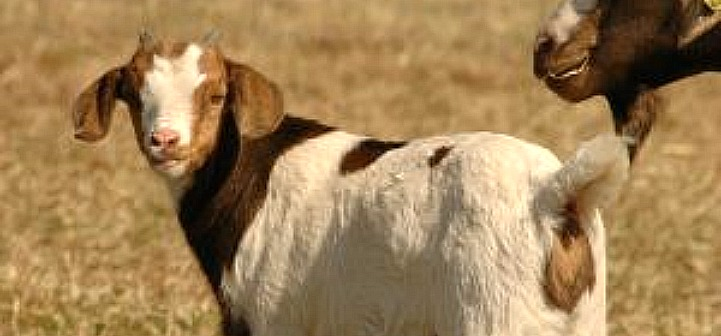Browse is the tips of woody shrubs and trees, as well as the occasional broad-leaved plant, and forbs are flowering plants. Some examples of browse and forbs are mimosa, sagebrush, chicory, and briars. For more information, see Goat Vegetation Management.…
What minerals do goats require?
To achieve maximum production levels, it is necessary to provide a free choice complete goat mineral supplement or a 50:50 mix of trace mineralized salt and dicalcium phosphate. In addition, goats need the following:
Calcium: Major functions include blood clotting, membrane permeability, muscle contraction, nerve function, cardiovascular functions, and enzyme activity. Adequate levels of calcium for lactating goats are necessary to prevent parturient paresis (milk fever). In browsing or grain-fed goats, the addition of a calcium supplement (dicalcium phosphate, limestone, …
How much water do goats need daily?
Goats need two to three gallons of water daily. However, goats may get by on only about a half gallon a day or less while grazing lush green grass. In addition, a lactating doe requires more than two to three gallons of water, depending on how much she is getting from grass and how much milk she is producing. For more information, see: Goat Nutrition Water .…
What is the difference between mad cow disease and scrapie?
Both “mad cow disease” (bovine spongiform encephalopathy, or BSE) and scrapie are forms of transmissible spongiform encephalopathy (TSE). Bovine spongiform encephalopathy (BSE), commonly known as mad-cow disease, is a fatal, neurodegenerative disease in cattle, that causes a spongy degeneration in the brain and spinal cord. BSE usually has a long incubation period, about four years, usually affecting adult cattle at a peak age onset of four to five years, all breeds being equally susceptible. In the United Kingdom, the country …
What are some diseases goats can transmit to humans?
Goats can transmit several diseases to humans, including:
Leptospirosis — This disease is widely distributed in domestic and wild animals. Transmission of the organism to humans can occur through skin abrasions and mucous membranes by contact with urine or tissues of animals infected with leptospirosis. Inhalation or ingestion of organisms can also transmit the disease. The disease can vary from an asymptomatic infection to severe disease with symptoms ranging from flu-like ailments to liver and kidney failure, encephalitis, and pulmonary …
How do I treat skin fungus or ringworm in my goats?
Isolate the goat and treat early and aggressively. Clip the hair, remove any scales/crust, scrub with Nalvasan or Betadine, apply topical antifungals often, and continue for up to six weeks. Be sure to disinfect all equipment and the area daily. You may need to use a systemic antibiotic like Penicillin G or Nulfor (extra label use by a veterinarian) if the fungus is deeper than the skin only. In some cases, a systemic antifungal drug is needed, and these will …
Which diseases of sheep and goats are reportable?
According to the USDA’s National Animal Health Reporting System (www.aphis.usda.gov/vs/nahss/disease_status.htm#sheep), the following sheep and/or goat diseases are reportable to state and/or federal animal health authorities. Individual states may require additional diseases to be reported, and additional diseases may be added to this list at any time.
Foot-and-mouth disease (FMD)
Vesicular stomatitis (VS)
Rinderpest
Peste des petits ruminants
Rift Valley fever
Bluetongue
Sheep pox and goat pox
Anthrax (Bacillus anthracis)
Aujesky’s disease (Pseudorabies)
Echinococcosis/hydatidosis
Heartwater …
